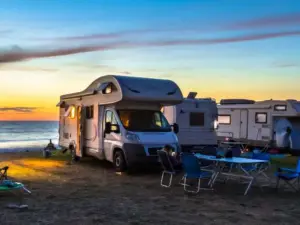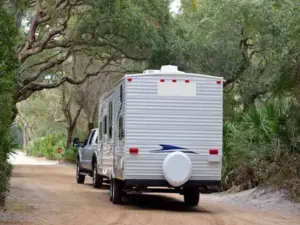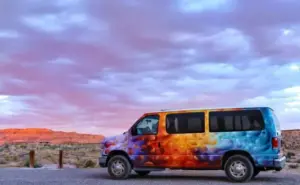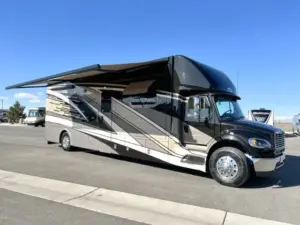It’s the dream for many to get their own RV and drive it through all 50 state borders, and that dream starts with a simple question: When do you need a special license to drive an RV?
Read for travel trailer towing tips.
Read here for travel trailer maintenance tips.
What is a Special License?
There are two special licenses that you need to be aware of first and foremost if you own an RV: a commercial and non-commercial license. Some states require a non-commercial license before you can drive a recreational vehicle over a certain weight limit. On the other hand, a few others will require a commercial driver’s license (CDL) over the same weight standards.
Broadly speaking, it’s best to have a reference when you’re taking your RV to a new state for the first time. If you don’t already have a note so to speak, then you can bookmark this page and find all the information you need below about special driver’s license requirements for your RV.
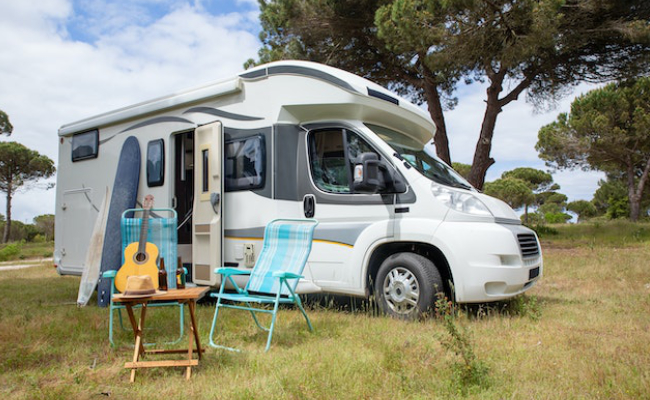
Types of Special Licenses for an RV
There are generally three types of RV license requirements across the U.S. These are: special commercial licenses, noncommercial class licenses, and driver’s license endorsement. The state’s Department of Motor Vehicles (DMV) will also factor in the single or combined weight of your vehicle when assigning your class.
If you have multiple vehicles like a travel trailer (towing vehicles), then state licensing requirement may be employed. Fifth wheels also receive its own rules for Michigan. While a certain length for motor vehicles is observed in Wisconsin instead of what your RV weighs.
Broadly speaking, state laws vary so having a quick reference point like this blog can save you the hassle of searching back and forth about the license required for each state you’re visiting on your trip.
Commercial Driver’s License
In general, a CDL is a special license that authorizes you to drive heavy and large vehicles like dump trucks, buses, moving vans, and other larger machines. The Federal Motor Carrier Safety Administration outlines more information for your reference.
In the case of RVs, this typically means that yours will be likely be subject to a Class B RV license requirement if your motor vehicle weight exceeds the 26,000 lbs. threshold that most local DMV endorses. Unless you have multiple vehicles which would then require Class A special RV driver’s license.
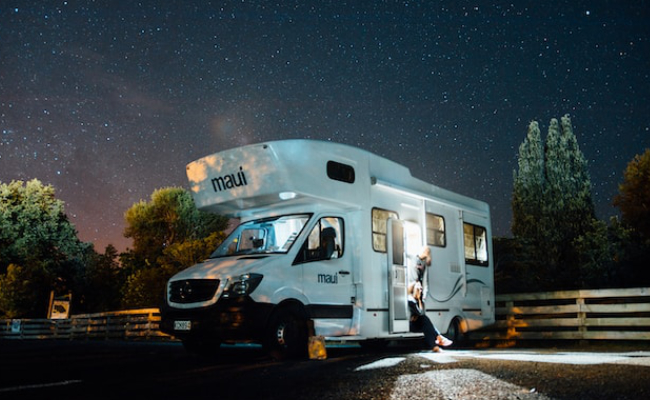
Non-commercial Driver’s License
A non-commercial special license is sometimes enough to meet the RV license requirements of the local DMV. For example, South Carolina only needs a non commercial class (Class E) license for single vehicle over 26,000 pounds. While Class F is required for multiple vehicles with combined weight of over 26,000 pounds.
Driver’s License Endorsement
A state endorsement is often easier to get compare to the other two special licenses above. However, the more requirements for motorhomes tend to be very specific for each state. Therefore, it’s best practice to check with the local DMV to ensure that you are applying for the correct license required by their state.
Which States Requires a Commercial License to Drive to RV?
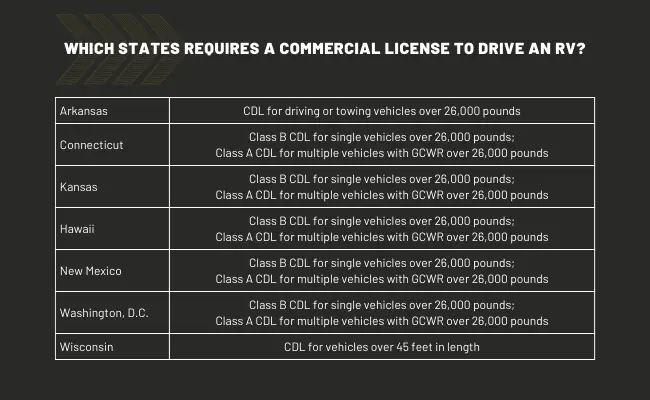
Arkansas, Connecticut, Hawaii, Kansas, New Mexico, and Washington, D.C require a Class B license when the Gross Combined Weight Rating (GCWR) of your rig exceeds over 26,000 pounds. Meanwhile, you will need a CDL in Wisconsin if your vehicle is over 45 feet in length. In general, you will only need to worry about commercial licenses if your RV or trailer and towing car setup surpasses the weight limit for recreational vehicles that caps at 26,000 pounds in most states.
Which States Require a Special Non-Commercial License to Drive an RV?
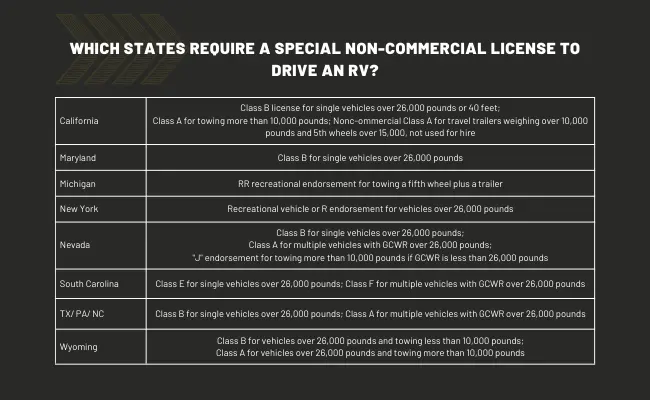
States like the one’s listed in the image above will require a special non-commercial licenses under certain conditions that vary depending on the state’s licensing requirements and your RV’s gross vehicle weight.
For example, Nevada requires larger vehicles a Class B license for a single vehicle over 26,000 pounds; Class A for multiple vehicles with GCWR over 26,000 pounds; and a “J” endorsement for towing more than 10,000 pounds if GCWR is less than 26,000 pounds.
Meanwhile, any vehicle that has gross vehicle weight rating of over 26,000 pounds will need a Class B license endorsement in Maryland.
You’ll also notice that a Recreational Vehicle or “R” endorsement (R Registration) is needed for New York for vehicles over 26,000 pounds. Conversely, Recreational Double “R” Endorsement is required to tow a fifth wheel plus a trailer in Michigan, although this special licensing will less likely apply to most RV owners or a standard travel trailer.
Which States Don’t Require a Special License to Drive an RV?
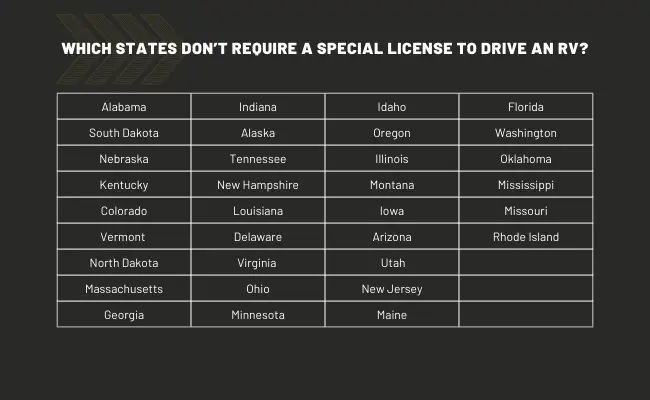
The good news is that majority of states do not require special RV driver’s license. Instead, you can go on your merry way with standard driver’s license for most of your trip. As of this writing, the state laws for the territories we listed above will only need your valid driver’s license required upon entry.
How Do You Apply for a Special Driver’s License to Drive an RV?
You can file an application for special license types and endorsements through your state’s DMV. The application process will vary depending on location, so check with your local authorities to ensure you’re taking the proper steps and submitting the necessary documentation.
Do You Need a Special License to Rent Recreational Vehicles or RVs?
For most RVs, you’ll only need a valid driver’s license to rent or drive an RV in most states. However, it’s best to check with the state DMV to ensure that you’re always following the latest protocols and licensing requirements.

What is the Largest Motorhome You Can Drive on a Car Licence?
Class B motorhomes or RV weigh between 6,000 to 8,000 pounds while a Class C vehicle is no more than 12,000 pounds. In most states, you can drive Class B or Class C vehicles using your standard car license.
On the other hand, Class A vehicles can weigh anywhere between 13,000 to 30,000 pounds. Due to the higher GCWR, Class A RVs above 26,000 pounds are often required to have special licenses. Therefore, if you want an RV that doesn’t typically need additional licensing, then going smaller is the smart choice.
How Can I Optimize My RV for Special Licensing?
Summing up, since the weight of your RV plays an important role in determining special licensing requirements, it’s important to carefully plan your purchase and modifications so that you can fully optimize your RV for the road ahead. If you need to weigh your RV following recent customization, you can simply take your motorhome to the nearest weight station or truck stop.
Final Thoughts
In conclusion, embarking on a journey through all 50 state borders in your own RV is a dream cherished by many adventure seekers. However, this dream requires careful consideration of the special license requirements that each state imposes on RV drivers.
To avoid any complications during your journey, having a quick reference point like this blog can save you the hassle of researching license requirements for each state individually. By understanding the licensing nuances and regulations for RV drivers in different states, you can ensure a smoother and more enjoyable trip.
Remember that laws and requirements can change, so it’s always wise to stay up-to-date with the latest information from the local Department of Motor Vehicles (DMV) in each state you plan to visit. With the right license and proper preparation, you can turn your dream of traveling through all 50 states in your RV into a memorable reality. So, buckle up, hit the road, and make the most of your RV adventure across the diverse landscapes of the United States. Happy travels!
Read here about RV and boat storage.
Read here about travel trailer accessories.


